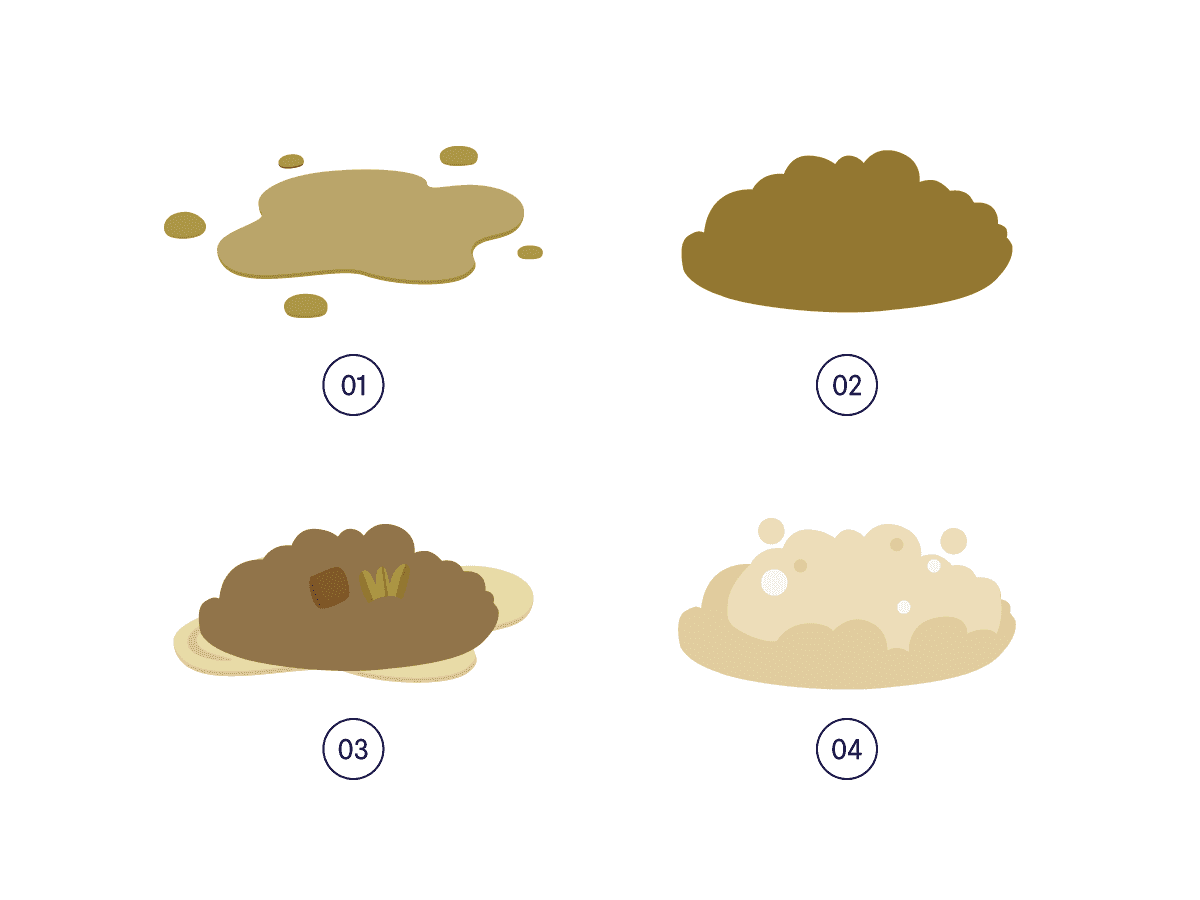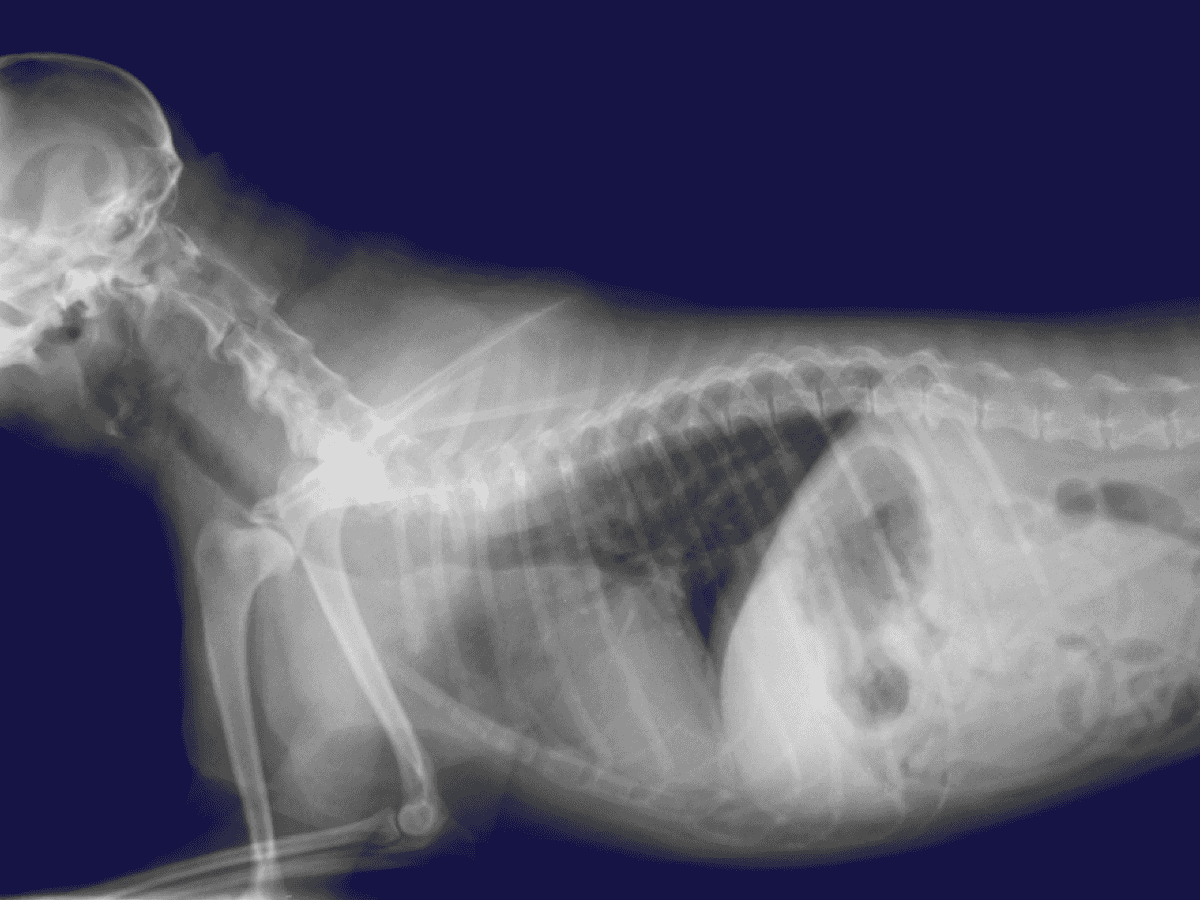Dog Throwing Up: Causes, Diagnosis, & Treatments
When your dog vomits or throws up, it's natural to be concerned. Though not all cases of vomiting are serious. Read on to learn more.
Table of Contents:
Minding your own business, you casually hear your dog get up from where they were resting, running towards the back door.
...Then you hear that dreadful sound. As they begin to vomit all over the floor. \
You jump out of your seat, concerned about why your dog just did this and what you need to do next.
This is a normal reaction all dog owners go through when they hear their dog throwing up. But before overreacting, it’s best to know what may have caused your dog to get sick in the first place. Determining the cause can be tricky as many leading factors can result in your dog feeling sick.
Let’s get started by diving into the basics of what vomiting is and the possible causes of why your dog may be throwing up.
What Is Vomit?
Vomiting has many names. It is known as throwing up, emesis, barfing, or puking.
Vomiting describes the spontaneous act of sharing contents from the stomach through the mouth and sometimes the nose.
As we walk through the causes of dogs throwing up, remember that vomiting is not an illness or a health condition. Instead, throwing up is a symptom.
Types of Vomit
No one wants to talk in detail about vomit -- it’s gross! But it’s important to know about the different types of vomit your dog may experience so that a vet can help diagnose the underlying issue.
1. Liquid Vomit: Liquid signifies indigestion or a build-up of stomach acid. Instead of a pure liquid, it may appear as a white foam. If stomach acid increases, this could be a sign that your dog is hungry.
2. Chunky Vomit: Now you know what your dog ate most recently! Ew! Chunks of dog food that may or may not have been digested will be on display for all to see. This could either reflect food that isn’t sitting right in the tummy or foods that are not easy to digest.
3. Vomit Containing Foreign Objects: So that’s where your child’s Hotwheel went! When your dog consumes a foreign object, its body detects it and forces it out. It doesn’t belong in the stomach and is eventually returned to you with a little extra liquid and odor.
4. Bilious Vomiting Syndrome (BVS): This syndrome triggers when a dog lacks fiber in its diet, drinks more water than normal, takes certain medications, has allergies, eats too many fatty foods, or eats grass. This type of bile keeps the yellow color and is either a fluid or a froth.
Colors of Vomit
Just like the different types of vomit tell the story, the colors paint the remaining picture. The darker the throw-up, the larger the chance your dog is suffering from something serious.
White: White foamy bile is a common type of throw-up and doesn’t always require immediate attention. It is most commonly seen in dogs with an empty stomach. If it frequently occurs, it could be related to a gastrointestinal disorder or an issue with their digestive system. At that time, you should contact your vet for guidance. Examples of diagnoses include kidney failure, pancreatitis, parvo, acid reflux, and kennel cough.
Yellow: Did you know that your dog may throw up because of an empty stomach? Sometimes, the stomach acid causes just enough irritation to make your dog feel sick. It’s often labeled as empty tummy syndrome. Another common cause is that Fido ate too fast and practically inhaled the meal. The result? Throw up in the form of yellow foam. Rest assured, yellow throw-up is usually harmless, but you can always give your vet a call to double-check.
Green: Have any patches of grass missing in your yard? Green throw-up resembles just that, the grass that your dog thought was a great idea to eat.
Brown: Let’s state the obvious -- if the throw-up is brown and has a horrible odor, your dog may have decided it was time to give feces a taste. This is normal for dogs who are curious or who are even nutrient deficient, but it should definitely be discouraged.
Red: Red throw-up has traces of blood and requires immediate attention from your veterinarian! Ulcers, gastrointestinal issues, or injuries are all conditions that trigger this type of vomit.
Black: Like red, black vomit raises concerns and deserves a visit with your veterinarian. Black throw-up could be digested blood. Causes of the dark throw-up include internal bleeding, a bleeding ulcer, or intestinal blockage.
What Causes Vomiting in Dogs?
Believe it or not, vomiting is rather common with dogs, and not all cases require a call to the vet. Sometimes it's hard to tell whether a dog is throwing up or just regurgitating. Do you know how to tell the difference?
When a dog throws up, it is usually followed by sounds of retching or coughing. Visually, you can see the abdominal muscles contract, making it a very active process. The consistency of the throw-up normally includes semi-digested food and bile, which is a digestive fluid of yellow, green, or orange color. The bile is brought up and out of the stomach or the small intestine.
Regurgitation takes a passive approach. A dog may simply bow its head as undigested food spills from its mouth. There should never be bile present if a dog regurgitates, only mucus or saliva.
So what actually causes a dog to throw up? Irritations in the stomach lining, also known as gastritis, induce sudden vomiting in addition to a decreased appetite. Gastritis is categorized into two categories: acute gastritis and chronic gastritis.
Acute Gastritis
Acute vomiting is defined as a sudden or severe onset of throwing up. It may last one day (24-hours) or linger on and off for a day or two.
Causes of acute vomiting can include:
Ingesting foreign materials, such as stuffing from a toy
Ingesting toxic substances, such as chocolate
Change in diet
Toxins or poisons
Failure of the kidney or liver
Bloat
Heat Stroke
Intestinal parasites
Viral or Bacterial infection
Reaction to medication
Travel sickness, or motion sickness
Frequently, dogs suffer from dietary indiscretion. This refers to when dogs eat things that are not a part of their normal diet. That’s right. Some dogs will eat anything. Examples include cat litter, garbage, plants, and carpet.
Dogs tend to eat grass most of the time. Why do they eat it just to return it to mother nature? By eating grass, dogs know that it will force them to throw up, or get their GI tract moving. It's a good tactic when their bellies feel ill and they want to relieve the discomfort. They don’t know that the grass they are ingesting may contain harmful chemicals, such as fertilizers, which can adversely affect them and cause them to feel worse.
Acute vomiting does not normally lead to a visit with the veterinarian; however, watch for signs of dehydration or other symptoms that will require their expertise.
Chronic Gastritis
Chronic vomiting is irregular and lasts for one to two weeks. Common causes may include:
Inflammatory Bowel Disease (IBD)
Chronic gastroenteritis
Allergies
Pancreatitis - check if your dog ate fatty foods that may have triggered the symptoms.
Metabolic conditions
Endocrine abnormalities
Cancer
Dogs Throwing Up vs. Puppies Throwing Up
If a puppy throws up, this alerts immediate concern. Puppies are young, and their immune systems are still developing. One episode of throwing up puts them at risk for dehydration.
There are two common causes for puppies throwing up -- infectious diseases and intestinal parasites.
Infectious Diseases
Parvovirus is a serious infectious disease that can lead to life-threatening symptoms. It is a highly contagious virus that affects dogs of all ages; however, those who are unvaccinated and six months or younger are at the highest risk.
Parvo attacks the dog’s gastrointestinal tract. It spreads through contaminated stools, environments, and even people. It also spreads through direct contact (dog-to-dog). This disease lingers, too, surviving the elements (both hot and cold weather) for long periods.
If you suspect your dog has parvo, look for signs below and contact your veterinarian immediately:
Lethargy
Loss of appetite
Abdominal pain
Vomiting
Diarrhea, often containing blood
Intestinal Parasites
Dogs are prone to roundworms, hookworms, whipworms, tapeworms, and coccidia. It sounds awful, but did you know that puppies are born with worms? They are also susceptible to worms through their mother’s milk. This is the reason why puppies need deworming. Antiprotozoal medications also work to fight off intestinal parasites, and regularly giving your dog heartworm medication can also help to ward off other parasites, too.
How Do I Know What Caused My Dog To Throw Up?
We now know what can cause dogs to throw up, but which one applies to your situation? There are a few questions that need answers:
Did your dog eat something they shouldn’t have? Check around the area for anything your dog may have gotten into if you are unsure.
Was there a recent change in your dog’s diet? This includes their primary food, new treats that may have been introduced, and table food.
Describe what the vomit looks like. Are there chunks of undigested food? Or does it look like bile? What color is it? Are there traces of blood?
Was this the first time your dog threw up today, or is it happening frequently? Keep track of how often. Take note of whether or not they are getting up to eat or drink.
Are there any other symptoms with the throw-up, or is your dog showing signs of pain or discomfort?
Based on your responses, it may be time to contact your veterinarian if you are concerned about your pup.
On the other hand, your dog may pull a 180 overnight and act as if nothing ever happened the following day.
Let’s see what signs tell you it’s time to meet with your vet.
When Should I Take My Dog to the Vet For Vomiting?
Not sure when you should contact your veterinarian about your dog’s throw-up episodes? Here are some signs to look for indicating that your dog needs a visit with the vet:
Vomiting that continues for over one day
Three or more episodes of vomiting within one day
The quantity of vomit is unmeasurable
Vomit includes traces of blood
Diarrhea, bloody stool, lethargy, lack of appetite, increase or decrease in amount of water they drink
The onset of fever or pain
During your visit, let your veterinarian know exactly what you have observed with your dog, both the symptoms and behavior changes. They may decide to run a series of tests such as:
Performing an X-Ray or ultrasound to determine if a foreign object was ingested
Blood tests to rule out or diagnose kidney failure or pancreatitis
Fecal tests
Endoscopy
Biopsy
After running the necessary tests, your vet should provide you with a diagnosis as well as the next steps to treat it and get your pup feeling like themselves again.
How To Help a Dog That’s Throwing Up
Your main goal is to comfort your dog’s stomach and ride the road to recovery with them, assuring they are healthy at the destination. Depending on the diagnosis, the treatment will differ. Below we will break down the treatment for acute gastritis and chronic gastritis.
Acute Gastritis
If your pup has just thrown up and they’re done after maybe one or two episodes, your dog’s tummy needs time to recover.
Here are some tips for you to try to help your dog recover smoothly:
Withhold food for a few hours
Introduce small amounts of water for hydration within the first 24 hours
Reintroducing food after 24 hours pass without an episode of vomit
Gradually increase food over the next couple of days, documenting if your dog gets sick
Immediately contact your veterinarian if your dog continues to throw up
Your dog needs to stay hydrated and replenish the protein, vitamins, and minerals required in their diet. As you reintroduce foods, focus on bland foods first. These are the perfect option for dogs with upset stomachs. A bland diet consists of sweet potato, boiled potatoes, white rice, chicken that is skinless and boiled, or white fish.
Treatment for Chronic Gastritis
You may be sent home from the vet with medications. Antibiotics are prescribed to fight off infections. Antiemetics control the urge to vomit. More severe cases require fluid therapy or surgery. Omeprazole is another medication, or proton pump inhibitor, used for dogs that experience stomach ulcers.
Another form of treatment your dog may need to undergo is fluid therapy, especially if their hydration level becomes a critical risk.
Key Takeaways
Dogs throw up, period. But as their best friend, you don’t have to panic.
First, observe your furry friend's behavior and actions. Become the detective assigned to the case of why your dog is throwing up. It could be simple: they ate something they shouldn’t have and will recover in an hour or two. Or, it could be due to an underlying medical condition that needs immediate attention from their veterinarian.
Nearly all diagnoses of throwing up can be treated, but you need to know what triggered it before taking action. Don’t ignore the look and smell of the vomit, no matter how gross it may seem, especially if your dog is broadcasting additional symptoms. Seek medical attention immediately if your dog is not acting like themselves.
Sources:
Dog Vomiting 101: Why it Happens | Found Animals
Is Your Dog Throwing Up? Dog Vomiting: A Vet Basics Guide | Veterinarians.org





